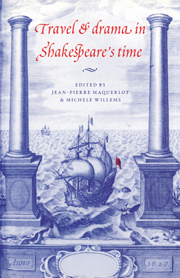Book contents
- Frontmatter
- Contents
- List of contributors
- 1 Introduction
- 2 Foreign relations in Jacobean England: the Sherley brothers and the ‘voyage of Persia’
- 3 ‘The naked and the dead’: Elizabethan perceptions of Ireland
- 4 The Elizabethans in Italy
- 5 Tragic form and the voyagers
- 6 Nationality and language in Thomas Kyd's The Spanish Tragedy
- 7 Marlowe's Argonauts
- 8 Pirates and ‘turning Turk’ in Renaissance drama
- 9 The wrong end of the telescope
- 10 ‘Travelling hopefully’: the dramatic form of journeys in English Renaissance drama
- 11 ‘Seeing things’: Amazons and cannibals
- 12 Industrious Ariel and idle Caliban
- 13 The New World in The Tempest
- 14 ‘What's past is prologue’: metatheatrical memory and transculturation in The Tempest
- 15 Lope de Vega and Shakespeare
- Index
6 - Nationality and language in Thomas Kyd's The Spanish Tragedy
Published online by Cambridge University Press: 22 September 2009
- Frontmatter
- Contents
- List of contributors
- 1 Introduction
- 2 Foreign relations in Jacobean England: the Sherley brothers and the ‘voyage of Persia’
- 3 ‘The naked and the dead’: Elizabethan perceptions of Ireland
- 4 The Elizabethans in Italy
- 5 Tragic form and the voyagers
- 6 Nationality and language in Thomas Kyd's The Spanish Tragedy
- 7 Marlowe's Argonauts
- 8 Pirates and ‘turning Turk’ in Renaissance drama
- 9 The wrong end of the telescope
- 10 ‘Travelling hopefully’: the dramatic form of journeys in English Renaissance drama
- 11 ‘Seeing things’: Amazons and cannibals
- 12 Industrious Ariel and idle Caliban
- 13 The New World in The Tempest
- 14 ‘What's past is prologue’: metatheatrical memory and transculturation in The Tempest
- 15 Lope de Vega and Shakespeare
- Index
Summary
Thomas Kyd's remarkable play The Spanish Tragedy acknowledges in its title a national identity other than its author's. Notoriously, its denouement presents a babel of languages – Latin, Greek, Italian, French – likely to have been unfamiliar, at least in colloquial form, to the great majority of its earliest audiences. Yet the play's critical record shows that with few exceptions modern interpreters have paid scant attention to the national politics of The Spanish Tragedy, or to the association of these politics with questions of linguistic difference. I want in this essay to sketch in the framework of political (and religious) associations that would attach to Spain and Spaniards in English minds of the 1580s, or a prominent faction among them at least, and to identify so far as I can how such associations might properly influence our understanding of the play. Much has been written about the play's immensely fertile treatment of revenge; about its wonderfully adroit structure of ironies; about its preoccupation with personal and social justice; about its melodramatic excitements and its hero's eloquent introspection (taken up and sophisticated in Shakespeare's Hamlet). I wish to take nothing away from any of these interpretations; I have indeed tried elsewhere to contribute to them. I wish only to ask whether we can bring the play even more sharply into focus, and put ourselves more fully in touch with its original structure of feeling, if we attend to questions of nationality and language.
- Type
- Chapter
- Information
- Travel and Drama in Shakespeare's Time , pp. 87 - 105Publisher: Cambridge University PressPrint publication year: 1996
- 1
- Cited by



